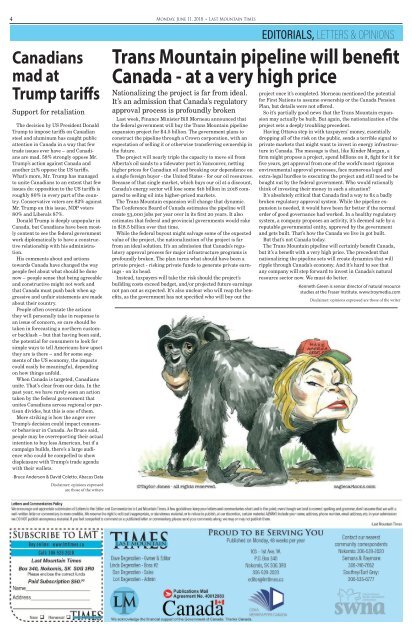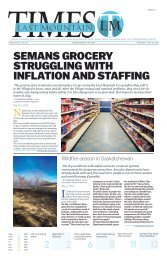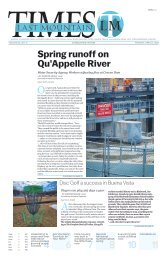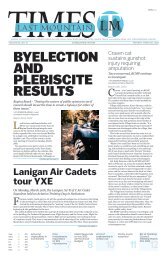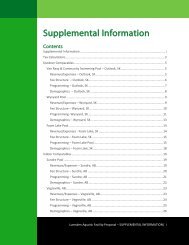Last Mountain Times June 11 2018
Create successful ePaper yourself
Turn your PDF publications into a flip-book with our unique Google optimized e-Paper software.
4 Monday, <strong>June</strong> <strong>11</strong>, <strong>2018</strong> • <strong>Last</strong> <strong>Mountain</strong> <strong>Times</strong><br />
Canadians<br />
mad at<br />
Trump tariffs<br />
Support for retaliation<br />
The decision by US President Donald<br />
Trump to impose tariffs on Canadian<br />
steel and aluminum has caught public<br />
attention in Canada in a way that few<br />
trade issues ever have – and Canadians<br />
are mad. 58% strongly oppose Mr.<br />
Trump’s action against Canada and<br />
another 21% oppose the US tariffs.<br />
What’s more, Mr. Trump has managed<br />
to unite Canadians to an extent that few<br />
issues do: opposition to the US tariffs is<br />
roughly 80% in every part of the country.<br />
Conservative voters are 82% against<br />
Mr. Trump on this issue, NDP voters<br />
80% and Liberals 87%.<br />
Donald Trump is deeply unpopular in<br />
Canada, but Canadians have been mostly<br />
content to see the federal government<br />
work diplomatically to have a constructive<br />
relationship with his administration.<br />
His comments about and actions<br />
towards Canada have changed the way<br />
people feel about what should be done<br />
now – people sense that being agreeable<br />
and constructive might not work and<br />
that Canada must push back when aggressive<br />
and unfair statements are made<br />
about their country.<br />
People often overstate the actions<br />
they will personally take in response to<br />
an issue of concern, so care should be<br />
taken in forecasting a northern customer<br />
backlash – but that having been said,<br />
the potential for consumers to look for<br />
simple ways to tell Americans how upset<br />
they are is there – and for some segments<br />
of the US economy, the impacts<br />
could easily be meaningful, depending<br />
on how things unfold.<br />
When Canada is targeted, Canadians<br />
unite. That’s clear from our data. In the<br />
past year, we have rarely seen an action<br />
taken by the federal government that<br />
unites Canadians across regional or partisan<br />
divides, but this is one of them.<br />
More striking is how the anger over<br />
Trump’s decision could impact consumer<br />
behaviour in Canada. As Bruce said,<br />
people may be overreporting their actual<br />
intention to buy less American, but if a<br />
campaign builds, there’s a large audience<br />
who could be compelled to show<br />
displeasure with Trump’s trade agenda<br />
with their wallets.<br />
-Bruce Anderson & David Coletto, Abacus Data<br />
Disclaimer: opinions expressed<br />
are those of the writers<br />
Trans <strong>Mountain</strong> pipeline will benefit<br />
Canada - at a very high price<br />
Nationalizing the project is far from ideal.<br />
It’s an admission that Canada’s regulatory<br />
approval process is profoundly broken<br />
<strong>Last</strong> week, Finance Minister Bill Morneau announced that<br />
the federal government will buy the Trans <strong>Mountain</strong> pipeline<br />
expansion project for $4.5 billion. The government plans to<br />
construct the pipeline through a Crown corporation, with an<br />
expectation of selling it or otherwise transferring ownership in<br />
the future.<br />
The project will nearly triple the capacity to move oil from<br />
Alberta’s oil sands to a tidewater port in Vancouver, netting<br />
higher prices for Canadian oil and breaking our dependence on<br />
a single foreign buyer - the United States - for our oil resources.<br />
Because of that single market, which buys our oil at a discount,<br />
Canada’s energy sector will lose some $16 billion in <strong>2018</strong> compared<br />
to selling oil into higher-priced markets.<br />
The Trans <strong>Mountain</strong> expansion will change that dynamic.<br />
The Conference Board of Canada estimates the pipeline will<br />
create 53,000 jobs per year over in its first 20 years. It also<br />
estimates that federal and provincial governments would rake<br />
in $18.5 billion over that time.<br />
While the federal buyout might salvage some of the expected<br />
value of the project, the nationalization of the project is far<br />
from an ideal solution. It’s an admission that Canada’s regulatory<br />
approval process for major infrastructure programs is<br />
profoundly broken. The plan turns what should have been a<br />
private project - risking private funds to generate private earnings<br />
- on its head.<br />
Instead, taxpayers will take the risk should the project’s<br />
building costs exceed budget, and/or projected future earnings<br />
not pan out as expected. It’s also unclear who will reap the benefits,<br />
as the government has not specified who will buy out the<br />
EDITORIALS, LETTERS & OPINIONS<br />
project once it’s completed. Morneau mentioned the potential<br />
for First Nations to assume ownership or the Canada Pension<br />
Plan, but details were not offered.<br />
So it’s partially good news that the Trans <strong>Mountain</strong> expansion<br />
may actually be built. But again, the nationalization of the<br />
project sets a deeply troubling precedent.<br />
Having Ottawa step in with taxpayers’ money, essentially<br />
dropping all of the risk on the public, sends a terrible signal to<br />
private markets that might want to invest in energy infrastructure<br />
in Canada. The message is that, like Kinder Morgan, a<br />
firm might propose a project, spend billions on it, fight for it for<br />
five years, get approval from one of the world’s most rigorous<br />
environmental approval processes, face numerous legal and<br />
extra-legal hurdles to executing the project and still need to be<br />
bought out by the federal government. Who would rationally<br />
think of investing their money in such a situation?<br />
It’s absolutely critical that Canada find a way to fix a badly<br />
broken regulatory approval system. While the pipeline expansion<br />
is needed, it would have been far better if the normal<br />
order of good governance had worked. In a healthy regulatory<br />
system, a company proposes an activity, it’s deemed safe by a<br />
reputable governmental entity, approved by the government<br />
and gets built. That’s how the Canada we live in got built.<br />
But that’s not Canada today.<br />
The Trans <strong>Mountain</strong> pipeline will certainly benefit Canada,<br />
but it’s a benefit with a very high price. The precedent that<br />
nationalizing the pipeline sets will create dynamics that will<br />
ripple through Canada’s economy. And it’s hard to see that<br />
any company will step forward to invest in Canada’s natural<br />
resource sector now. We must do better.<br />
-Kenneth Green is senior director of natural resource<br />
studies at the Fraser Institute. www.troymedia.com<br />
Disclaimer: opinions expressed are those of the writer


